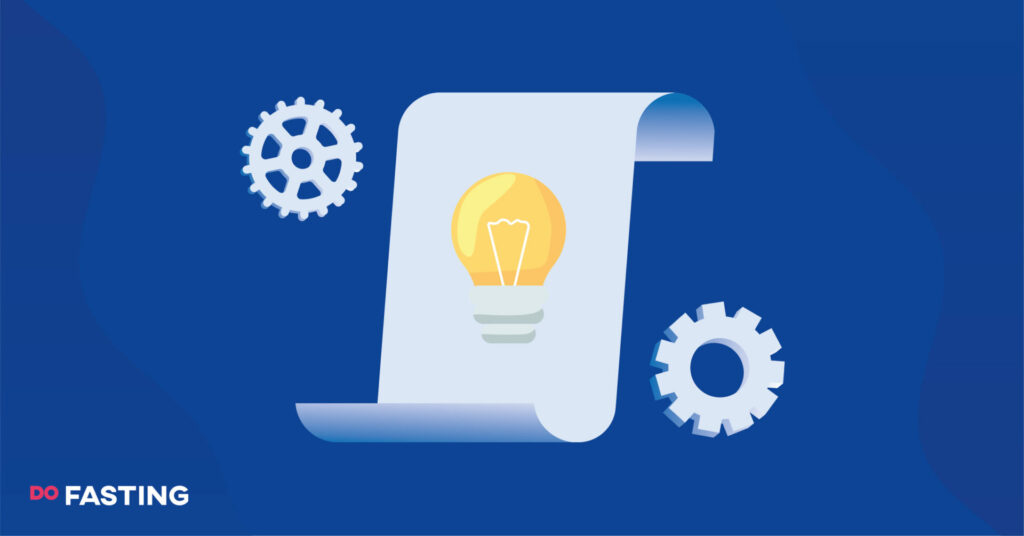Contents
What Is Acne?
Acne is a skin condition characterized by the appearance of different kinds of spots, oily skin, and soreness in the areas affected. It is caused by blockages in the hair follicles on the skin caused by dirt, impurities, excess oil, or sebum. People with oily skin are more prone to acne, but it can affect people with all skin types.
The most common symptoms of acne are:
- Whiteheads — closed plugged pores.
- Blackheads — open plugged pores.
- Papules — little red bumps, usually tender.
- Pimples — papules with pus-filled tips.
- Solid lumps under the skin, known as nodules.
- Pus-filled lumps under the skin, known as cystic lesions.
Take a
1-minute quiz
and discover how much weight you can lose with DoFasting!

What Causes Acne: Main Risk Factors
Acne is generally caused by excess sebum production, but this can be triggered by many lifestyle factors. Let’s take a look at some of its common causes:
Inflammation and hormones
An unbalanced diet can lead to insulin spikes. Insulin makes androgens (a kind of hormone directly related to the appearance of acne) more active, which increases the production of insulin-like growth hormone factor 1 (IFG-1) and eventually boosts the generation of sebum.
In short, overnutrition and diets rich in fats, sugars, and processed carbohydrates are related to inflammation and hormonal imbalances, which can lead to the appearance of acne.
Lifestyle
In addition to your eating habits, several lifestyle factors can contribute to the formation of acne:
- Medications — some medications are known to cause acne, including lithium (used to treat depression and bipolar disorder), steroids, and some drugs that treat epilepsy.
- Smoking — this habit tends to cause acne, specifically in post-adolescent people.
- Not getting enough sleep — lack of sleep can contribute to an overproduction of the hormones that cause acne.
- Stress levels — increased stress levels can cause or worsen oil production in predisposed individuals.
- Wearing makeup — it can feel like a vicious cycle, especially if you’re wearing makeup to cover up acne, but many makeup products can clog pores and lead to more symptoms.
Food
Certain products can lead to acne breakouts. If you’re struggling with skin conditions, you may want to watch your intake of some foods commonly present in our diet:
- Refined grains and sugars — consuming significant quantities of refined products puts you at an increased risk of many conditions, including acne, weight gain, and poor gut health, which is also related to poor skin health on its own. Keeping refined grains and sugars out of your diet will help keep your skin and digestive system healthy.
- Dairy — most studies conclude that dairy consumption can irritate acne, although the link between the two is still under research.
- Fast food — as tasty as they might be, burgers, hot dogs, and other foods prevalent in the Western diet have been linked to an increase in acne due to their high content of refined fats and carbs. Overeating fast food is also bad for the digestive system, can weaken the immune system, and undermine your weight loss efforts.
- Consuming foods high in omega-6 fatty acids — foods like soybean oil and corn oil, also present in fast food, are high in omega-6 fatty acids, which are linked to inflammation, and ultimately to acne outbreaks. For clear skin, make sure you supplement your diet with more omega-3s.
- Foods you have intolerances to — this can change from person to person, but food intolerances lead to an inflammatory response, which can cause acne breakouts.
5 Ways Fasting Helps Eliminate Acne
Intermittent fasting is an eating pattern that alternates between eating and fasting periods. It is mainly used for weight loss, but it actually has many benefits for overall health, including your skin. Let’s take a look at how a change as simple as organizing an eating window in your day-to-day can help you in your fight against acne:
1. More efficient hormone regulation
One of the benefits of intermittent fasting is that it can have a positive impact on hormone regulation in the body, which at the same time helps stabilize blood sugar levels and reduce inflammation.
By assisting with regulating different hormones (ghrelin, and insulin, for example), intermittent fasting can also help reduce acne outbreaks and their severity.
2. Better insulin resistance
Insulin levels can significantly affect acne, so it is best to keep this hormone under control.
Intermittent fasting has been shown to promote better blood sugar regulation by decreasing insulin resistance. In other words: it can help you make sure that your body responds properly to insulin, reducing the risk of acne outbreaks in the long run.
3. Reduced inflammation
Acne is an inflammatory skin condition, which means that fighting inflammation consecutively helps you clear your skin in the long run.
Research has shown that intermittent fasting and caloric restriction work together to decrease inflammatory markers in the body, making this habit a great ally when dealing with skin conditions.
4. Better resistance to oxidative stress
Another consequence of unhealthy habits like smoking, alcohol consumption, or diets rich in processed foods is oxidative stress.
Oxidative stress has been linked to multiple symptoms, like:
- Tiredness
- Brain fog
- Joint pain
- Decreased eyesight
- Headaches
- And skin conditions like acne
Quitting bad habits, or at least limiting them with a healthier lifestyle, can help you clear your skin and feel better in a matter of days.
Even the simplest intermittent fasting patterns, like the 12-hour fast, have been shown to reduce oxidative stress in the body, which could fight acne and improve the health of your skin cells.
5. Better sleep
Sleep keeps your body healthy and allows it time to recharge, heal, and reset. While sleeping, your body has time to fight skin problems like acne, which is why getting better sleep may benefit healthy skin.
Intermittent fasting, particularly styles where the eating window aligns with your circadian rhythm, has been proven to support better sleep quality and may even be effective in helping people with sleep conditions.
Take a
1-minute quiz
and discover how much weight you can lose with DoFasting!

Intermittent Fasting to Improve Skin Health: Tips for Beginners
As we have learned so far, intermittent fasting has multiple benefits associated with skin and general body health. But finding the right style of intermittent fasting may not be that obvious: there’s the OMAD method, the Leangains diet, the 12, 14, and 18-hour fasts… Where should you begin?
Experiment with different fasting schedules
We always recommend starting with a less challenging form of fasting, like a 12-hour fast. This intermittent fasting plan allows you to eat for 12 hours while saving the other half of your day for your fast. This allows your body to get used to fasting while experiencing the least side effects.
Once you get used to this pattern, you can move on to more challenging methods like the 16:8 method and the 5:2 fasting style.
Add skin-friendly foods to your diet
Adding skin-friendly foods to your diet will boost the healthy cells in your skin and help you see results faster. Some foods that’ll help you clear your skin include:
- Fatty fish — fish like salmon and sardines are rich in omega-3s, which are anti-inflammatory and good for your skin.
- Avocados — rich in healthy fats, avocados are powerhouses of nutrition.
- Walnuts — though they are rich in omega-6 fatty acids, they’ve got a good balance with omega-3s. They’re also very high in zinc, which is excellent for skin health, immune and metabolic function, disease prevention, and wound healing.
- Sunflower seeds — these seeds are rich in vitamin E, which is excellent for your skin.
- Sweet potatoes — these tubers are rich in beta-carotene, which contributes to good skin health. they’re also an excellent source of prebiotics, which can improve gut health and the diversity of the gut bacteria in your digestive tract.
- Red and yellow peppers — these kinds of peppers are high in vitamin C, which plays a role in collagen production and helps improve the skin’s health.
- Green tea — all tea, but mainly green tea, is high in antioxidants, which can protect your skin from oxidative stress and sun damage.
Don’t break your fast with carbs
When you are using an intermittent fasting style of eating, it is important that you ease your body out of the fasting period with the right kinds of foods.
If you break your fast with carbohydrates, your blood glucose is more likely to spike. And as we have discussed, a spike in blood glucose prompts an insulin response, which can lead to an acne breakout.
To avoid this, try to break your fast with easy to breakdown foods, like smoothies, soups, or bone broth.
You could even try pairing your intermittent fasting style with a low-carb diet like the keto diet to ensure you eat fewer carbs overall. In fact, there is evidence that a low-glycemic diet could be beneficial for people living with acne.
Track your progress
Intermittent fasting can be a brilliant method for treating acne, as well as for weight loss and overall health. If you want a complete solution to help you track every aspect of your fasting, the DoFasting app might be exactly what you need.
The DoFasting app will create a personalized fasting schedule based on your current condition and goals. Whether you want to reduce body weight and fat, eat at a reduced caloric intake, or just clear up your skin, the app will show you the right plan and estimate how long it will take you to get there.
DoFasting offers a space to track your fasting, food intake, and physical activity so you can stay accountable at all times. It also reminds you when to fast and shows you the progress you have made to help you stay on track.
Want to give it a try? Take our free test and get your personalized plan right away!
Intermittent Fasting: Risks to Consider
As with most changes in habits, the intermittent fasting approach has some contraindications you should be aware of:
First and most importantly, fasting isn’t recommended for pregnant or breastfeeding women, anyone with a history of eating disorders, or children under eighteen. If you fall into any of these groups, consider talking to your doctor before your first fast.
You should also consider that, especially during your first month of intermittent fasting, you may experience side effects like extreme hunger, fatigue, and weakness. If you suffer any of these symptoms, simply try an easier fasting plan or check out our tips for a safe fast.
If your health allows it and you feel ready to try this lifestyle, go for it. And remember that you can find the perfect plan for your needs and answers to all your questions about fasting with the DoFasting app.
Take a
1-minute quiz
and discover how much weight you can lose with DoFasting!

Fasting for Acne: Key Takeaways
Intermittent fasting is known to have a positive effect on all things health: from stabilizing blood pressure to lowering the risk of developing autoimmune disorders. And as we have learned in this article, it can also positively impact your skin health.
Fasting has been shown to help people treat and prevent acne breakouts. And starting this habit is as easy as turning on the DoFasting timer as soon as you finish today’s dinner.
See how DoFasting will improve your life
Find out what works for you with this 60-sec quiz approved by our experts and get your personal revolutionary fasting assistant.
Start the Quiz















